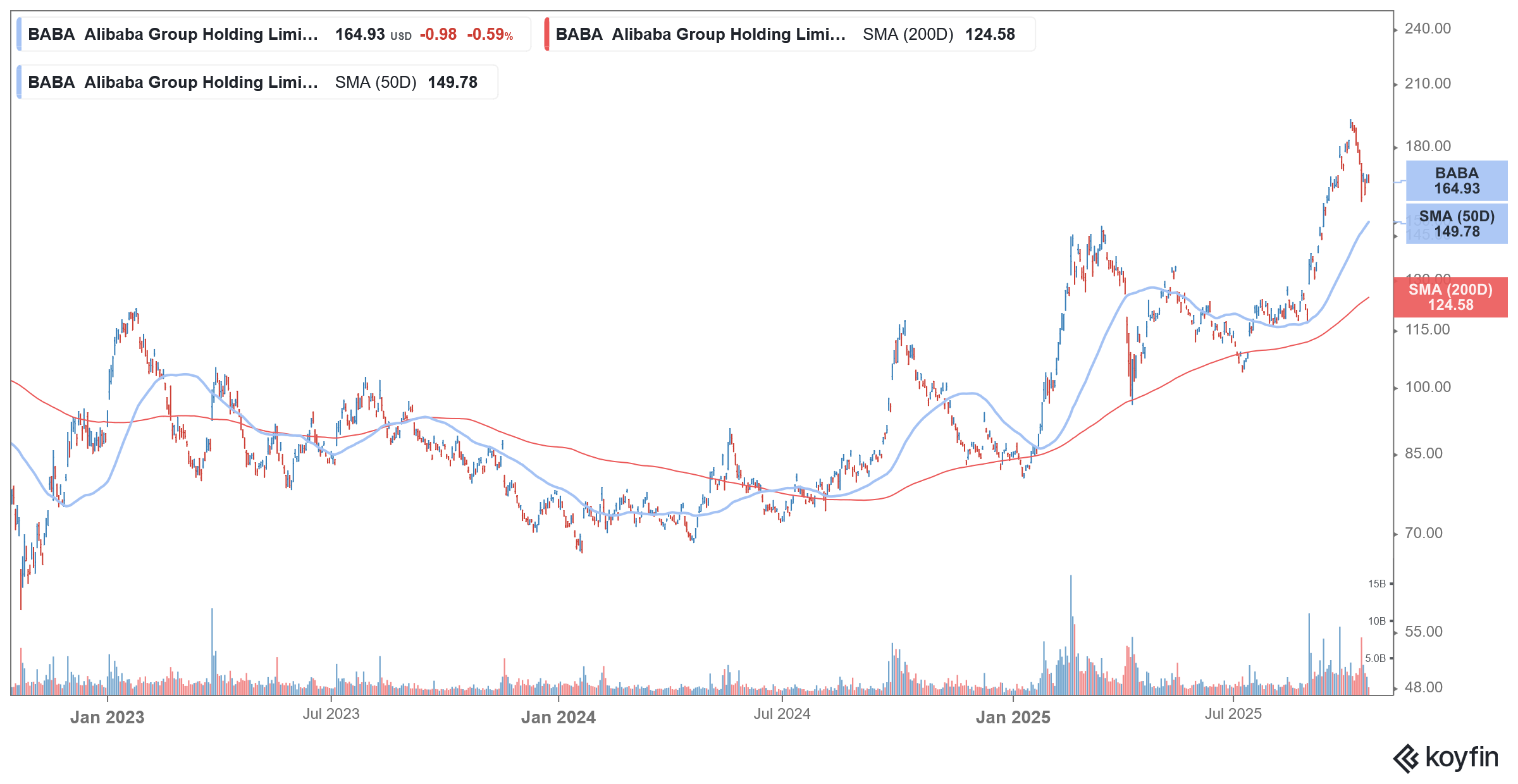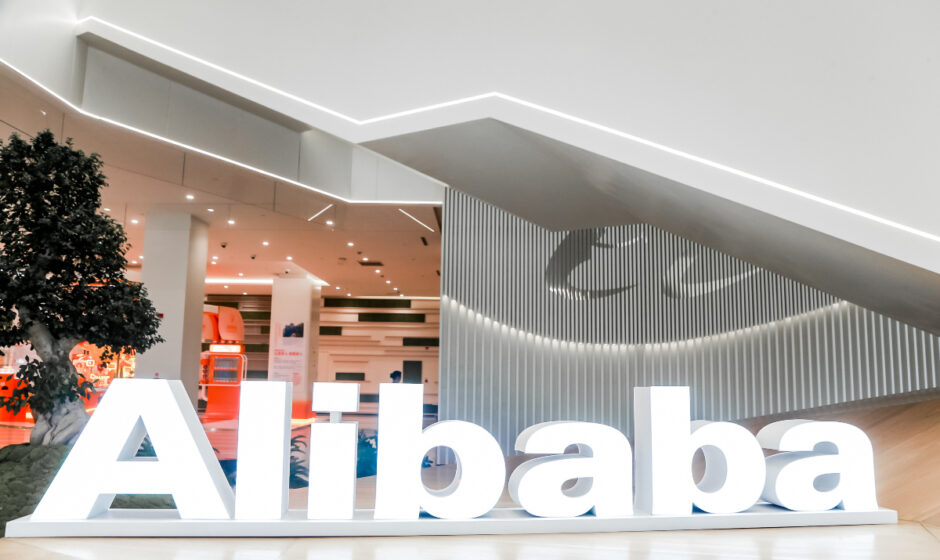Please note that we are not authorised to provide any investment advice. The content on this page is for information purposes only.
While there are concerns over tech companies’ ability to generate commensurate returns on their burgeoning capex towards artificial intelligence (AI), Alibaba (NYSE: BABA) has said that it is seeing strong returns and is already breaking even on AI investments in its e-commerce business.
Alibaba vice president Kaifu Zhang, who heads the company’s e-commerce AI applications, told reporters today that the company saw a 12% rise in advertising spend returns from AI-deployed tools, a “very rare” double-digit change that forecasts a “very significant positive impact” on the company’s Gross Merchandise Volume (GMV) during major shopping festivals.
His comments come a day after Alibaba began presales for Singles’ Day, China’s biggest shopping event of the year.
Alibaba Has Ramped Up AI Spending
Notably, last month, Alibaba announced new AI models and said that it plans to hike its AI spending as the Chinese tech giant strives to solidify its position as a major player in the global AI landscape.
The industry’s development speed far exceeded what we expected, and the industry’s demand for AI infrastructure also far exceeded our anticipation,” Alibaba’s CEO, Eddie Wu, told a developer conference in Hangzhou last month.
This bold move underscores Alibaba’s determination to solidify its position not only as an e-commerce giant but also as a comprehensive AI service provider. The company has declared artificial general intelligence (AGI) as its primary strategic objective, signaling a fundamental shift in its long-term vision.
BABA’s Cloud Business Is Witnessing Strong Momentum
Alibaba Cloud, which is the company’s cloud computing arm, showed strong momentum with revenues rising by 26% year-over-year in the June quarter, accelerating from the previous quarter. The company harped on the triple-digit year-over-year growth of its AI-related product revenue. It marked the eighth consecutive quarter of such growth, underscoring the strong market adoption of its AI solutions.
While there were previously concerns over tech companies’ ability to generate adequate return on investment (ROI) on their AI investments, many, including Alibaba, have shown strong progress.
“Companies only gain confidence to invest more when the visibility of the returns improve,” said Vey-Sern Ling, managing director at Union Bancaire Privee. He added, “So when they say they are raising investments in AI it indicates good demand from customers and good ROI.”


Alibaba Is Developing AI Chips
Alibaba is also developing AI chips, and last month it secured a major deal with state-owned telecom company China Unicom to supply AI chips for a new data center.
Of the nearly 23,000 domestically made AI chips currently powering the initial phase of the data center, Alibaba’s chip unit, T-Head, supplied approximately 72%. The remaining chips were sourced from other Chinese companies, including MetaX, Biren Tech, and Zhonghao Xinying, with plans to procure additional chips from Tecorigin (Wuxi), Moore Threads, and Enflame.
This partnership is particularly noteworthy in the context of the ongoing US-China technology standoff. The United States has imposed strict export controls on advanced AI chips, primarily targeting products from industry leader Nvidia, to prevent them from being used for military and national security purposes in China. This has created a vacuum in the Chinese market and spurred domestic companies to accelerate their own chip development.
China Is Pushing for Domestic Chips
As a state-owned enterprise, China Unicom’s decision to favor domestic chips over foreign alternatives reflects a broader government mandate to reduce reliance on US technology. It also signals a growing preference for homegrown solutions, with a China Unicom briefing even stating that Alibaba’s AI chip offers better hardware performance than Huawei’s Ascend 910B, a chip previously championed by authorities.
A key feature of Alibaba’s new chip is that it is being manufactured by a Chinese company. This marks a significant departure from the past, where Alibaba’s earlier AI processors were fabricated by Taiwan Semiconductor Manufacturing Company (TSMC), a firm that the US has since restricted from producing cutting-edge AI chips for China. This shift to domestic manufacturing is in direct alignment with China’s broader national strategy to build a homegrown semiconductor ecosystem and lessen its dependence on foreign technology.
Alibaba Is Back on the Radar of Global Funds
Many US investors shunned Chinese tech stocks in 2021 after the country’s brutal tech crackdown. However, Chinese stocks are now back on the radar of global funds. Since last year, China has announced several monetary and fiscal measures to support its economy, which is suffering from structural issues ranging from slow growth in domestic consumption, an aging economy, a property market slump, and external risks emanating from tariffs on Chinese exports by several countries, including the US, which is its biggest trading partner.
The country has also changed its stance towards private companies, in particular tech giants, and far from a crackdown, it is backing them amid the tech war with the US. Earlier this year, Chinese President Xi Jinping met the country’s entrepreneurs, including Alibaba’s co-founder Jack Ma, at a symposium. Ma’s participation in the event with Jinping becomes all the more important as the Chinese billionaire was the face of China’s crackdown on its tech moguls, whom the Communist Party believed had become too big for their shoes.
At that meeting, Xi stressed, “Now is the perfect time for private enterprises and entrepreneurs to thrive.” He called upon Chinese companies and entrepreneurs to “show their talent” while adding, “The new era and new journey have broad prospects for the development of the private economy and great potential.”
#Bubble #Fears #Alibaba #Breaking #Spending


